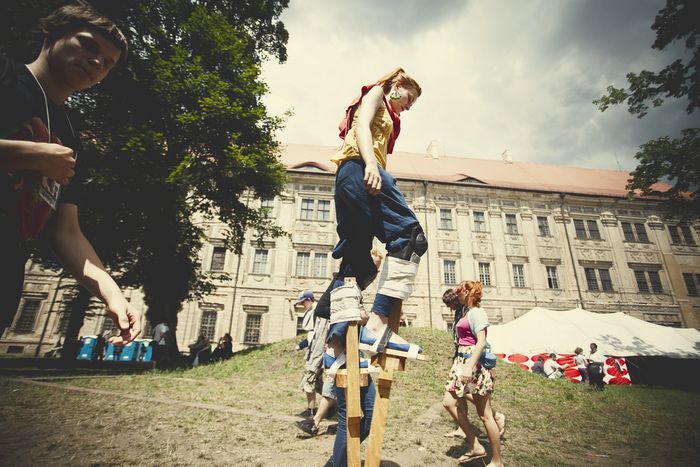
Is Poland Europe’s El Dorado?
Published on
Translation by:
 Ems_8674
Ems_8674
In less than two decades the current holder of the EU council presidency has gone from being communist to the sixth biggest economic power in the EU. Poland was also the only country to not suffer from the recession. Experts say this is the country’s golden era; a Polish expat and student share their views
It is a country in central Europe that has disappeared from the map over the last two hundred years, which has been occupied by nazis and experienced the communism of the soviet union. However things have changed. Poland’s transition from a planned economy to a market economy has made for a spectacular change.
80% of Poles are happy
If you compare the 1990s with 2011, wages have increased four-fold. Never has the country been as rich, organised and safe as it is today. A 2011 study reveals that 80% of Poles are happy with their lives. ‘Of course, Poland is now doing much better than ten years ago, especially thanks to improvements to infrastructure and the creation of new businesses,’ says Olga, 30, a teacher at the stendhal university of Grenoble in southern France. ‘The unemployment rate has gone down significantly and bank loans are more accessible for everyone.’
Read 'Polish migrants post-crisis in Ireland: is there no place like home?' on cafebabel.com
Poland has been one of the 27 member states of the European union since 2004, and was the only country in the EU to see its GDP have a positive growth during the crisis in 2010 (3.8%). This was largely thanks to European grants - with 67, 000 million euros over the 2007 - 2013 period, it is the most subsidised country up until 2013. The majority of this aid is to be used to improve the country’s infrastructure, which is still lagging behind that of the rest of Europe.
Key to success: updating the country
Refurbishing railways, roads and airports has generated many jobs in the construction industry, one of the keys to keeping the economy growing. This economic stability, together with the solidity of the banking system, a cheap and well-qualified workforce and European funding, laid the groundwork that allowed the country to start attracting the attention of investors from all over the continent, who now see the Poland as the main construction platform in Europe. ‘What foreigners like most about Poland is how cheap everything is here for them,’ comments Małgorzata, 23, a masters student at the university of Warsaw. ‘Of course I would encourage other Europeans to live in Poland,’ she adds. ‘It is at its economic peak. We Poles are also very hospitable people. The experience of living in a foreign country is always very enriching. I mean if you’re prepared to face all the bureaucracy and you’re still single and looking for a girlfriend then yes!’
Olga comments that she would like to return from France to work in Poland if wages were the same as in western Europe’. Małgorzata would also prefer to look for work in Poland. ‘Someone has to stay here to help improve the situation,’ she says. ‘I also don’t mind the idea of working abroad for a short time, as long as it’s not a job for which I would be overqualified.’ The fact that Poland does not yet belong to the seventeen-member eurozone and still has its own currency, the złoty, means that exports are continually rising, increasing the country’s competitiveness. Amidst debate over the future of the euro, this fact must be emphasised; all the more so with speculation that Greece may have to revert back to its own currency, the drachma, to overcome the crisis.
Prosperity, up to a point
In spite of everything, Poland is still a poor country compared to the rest of Europe. The average gross salary in mid-2010 was 3224 PLN per month (around 800 euros or 682.5 pounds), of which a large part goes towards social security and another towards income tax. ‘Compared to other countries, wages are very low yet prices keep rising; even the cost of basic products is sky-high. That has to change,’ says Małgorzata. Property prices have also tripled, despite the fact that Polish homes are on average smaller than elsewhere in Europe. It is perhaps why Olga and Małgorzata are not all that optimistic about the term ‘Polish prosperity’. ‘Poland is not a powerful enough country to face the crisis on its own,’ says Olga. ‘Our prosperity depends on the prosperity of other countries. The crisis and debt could affect us much more in a few years.’ For Małgorzata, it’s simply a case of an expression made up by the government in order to ‘boast about something that they haven’t actually done’.
Poland is on the right track, but it’s clear that there’s still a lot of work to do. ‘Poland is not an ideal country and there are always things that need to change,’ says Olga. ‘We have to improve the road network, eradicate poverty and reduce the unemployment rate.’ Małgorzata agrees. ‘We have to invest more in infrastructure and education, give young people more opportunities, help them to find work.’
Images: main (cc) piotrpawlowski/ flickr; vídeo (cc) imf / youtube
Translated from Polonia: ¿El Dorado de Europa?


